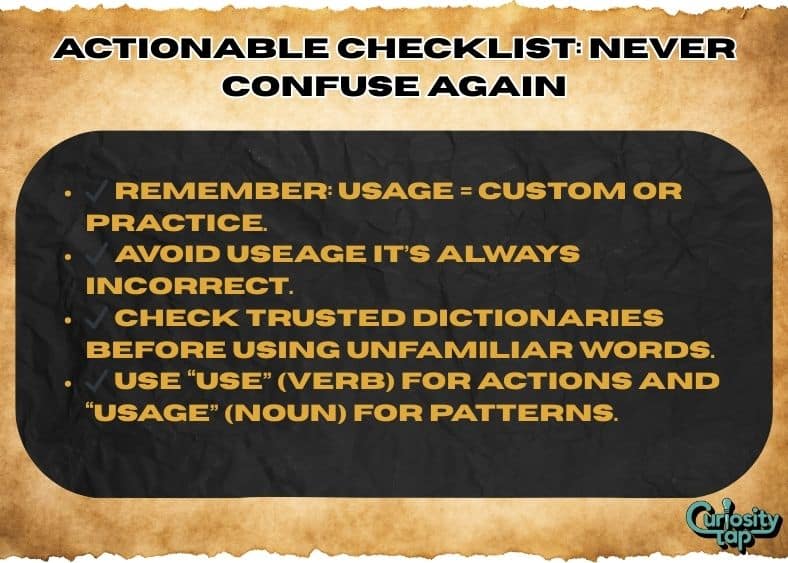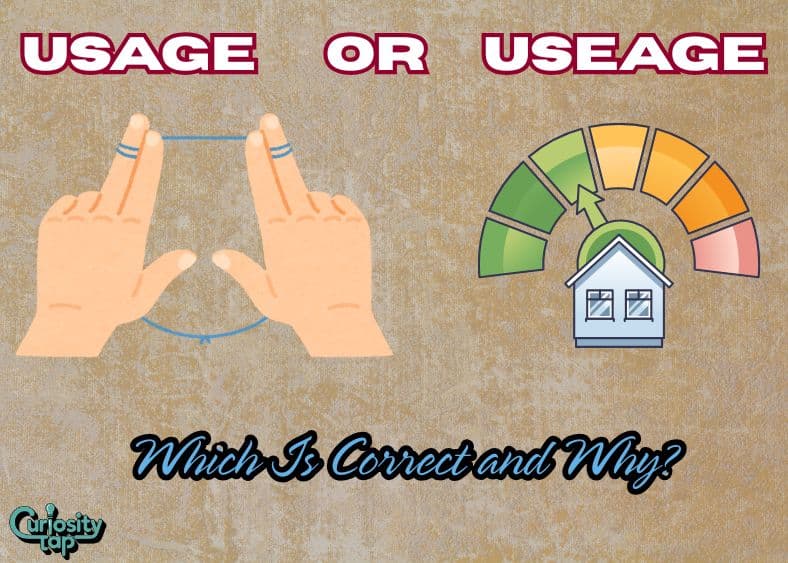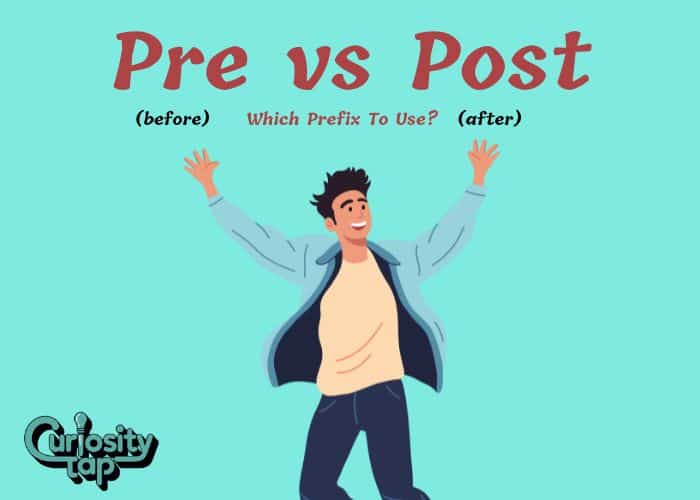Language learners, professionals, and even native speakers often stumble over small but important spelling differences. One such confusion is between usage and useage.
At first glance, both look plausible, but only one is correct in standard English.
In this article, we’ll break down the spelling, explain the meaning, share examples, and give you actionable tips so you never hesitate again. By the end, you’ll be confident about when and how to use the right form.
Why the Confusion Exists
The confusion arises because:
- English words often evolve from the root use, making useage appear logical.
- Similar words like courage and marriage follow the root + “-age” pattern.
- The extra “e” in useage feels natural but is grammatically incorrect.
This makes it easy to assume both versions exist, but in reality, only usage is recognized in dictionaries and professional writing.
Usage: The Correct Form
Definition of Usage
According to the Merriam-Webster Dictionary (2024), usage means:
- The way in which a word or phrase is normally used.
- A habitual or customary practice.
In short, usage refers to accepted practice or application.
Examples in Sentences
- Correct: The usage of smartphones has increased dramatically in education.
- Correct: This dictionary provides clear guidelines on English word usage.
Real-Life Example
Back in 2019, a university in the UK ran a survey on digital habits. Results showed that 92% of students preferred taking notes on tablets rather than paper.
Interestingly, the report used the word usage over 50 times when describing device habits.
If the authors had written useage, the credibility of their research would have been questioned. This shows why correct spelling matters in academic and professional contexts.
Useage: A Common Misspelling
Why It Seems Correct
Many learners assume that use + age = useage follows the same construction as words like marriage. However, this is a false analogy.
Recognition in Dictionaries
No standard English dictionary lists useage as an accepted word. Spell-checkers and academic style guides (APA, MLA, Chicago) all flag it as an error.
Bottom line: useage is simply a misspelling and should always be avoided.
Usage vs Useage: Quick Comparison
| Word | Correct? | Meaning | Example |
|---|---|---|---|
| Usage | ✅ Yes | Custom, application, accepted practice | The usage of idioms varies across cultures. |
| Useage | ❌ No | None | (Not valid in standard English) |
When to Use “Usage” Instead of “Use”
Usage vs Use in Grammar
- Use is typically a verb (I use my laptop daily).
- Usage is a noun (The usage of laptops has grown rapidly).
👉 Think of use as an action and usage as the concept or practice of that action.
Pros and Cons of Using “Usage”
Pros:
- Accepted by all dictionaries and style guides.
- Enhances credibility in academic/professional writing.
- Clearer when describing patterns or customs.
Cons:
- Can sound overly formal in casual writing.
- Misuse in place of “use” may feel awkward.

Actionable Checklist: Never Confuse Again
✔ Remember: usage = custom or practice.
✔ Avoid useage it’s always incorrect.
✔ Check trusted dictionaries before using unfamiliar words.
✔ Use “use” (verb) for actions and “usage” (noun) for patterns.
FAQs
Is “useage” ever correct in British English?
No. Both American and British English recognize only usage as correct.
What is the difference between “usage” and “use”?
Use is an action (verb), while usage is a pattern, practice, or accepted way of using something (noun).
Why do people write “useage”?
It looks logical by analogy with words like courage, but it’s a false construction.
Can I use “usage” in academic writing?
Yes, usage is standard and formal, making it perfect for academic and professional contexts.
Is “usage” more formal than “use”?
Yes. In casual writing, “use” may feel simpler. “Usage” works best when describing trends, customs, or linguistic rules.
Conclusion
In the debate of Usage or Useage, the verdict is clear: only usage is correct. While useage may look convincing, it has no place in standard English. If you want your writing to appear professional, credible, and error-free, always choose usage.
✅ Next time you write an essay, email, or report, double-check your spelling. Your credibility depends on it!
Call to Action
Want to sharpen your English and write successfully every time?
Check out our Grammar Checker Tool and never second-guess your spelling again!
Read our guide on Common English Misspellings to boost your skills even further.
Sources List
Sources:
- Merriam-Webster. (2024). Usage. Retrieved from: https://www.merriam-webster.com/dictionary/usage
- Cambridge Dictionary. (2024). Usage. Retrieved from: https://dictionary.cambridge.org/dictionary/english/usage
- Oxford English Dictionary. (2024). Usage. Retrieved from: https://www.oed.com
Read more knowledgeable blogs on Curiosity Tap
Is this article helpful?

Jackson Pearson is a passionate educator and language enthusiast behind the blog Jackson Pearson. With years of experience in teaching and writing, he specializes in simplifying complex grammar rules, breaking down tricky vocabulary, and crafting learning guides that are both engaging and practical. His mission is to help readers boost their English skills whether they’re beginners or brushing up for fluency. Through every article, Jackson brings clarity, structure, and a spark of curiosity to the world of English learning.



